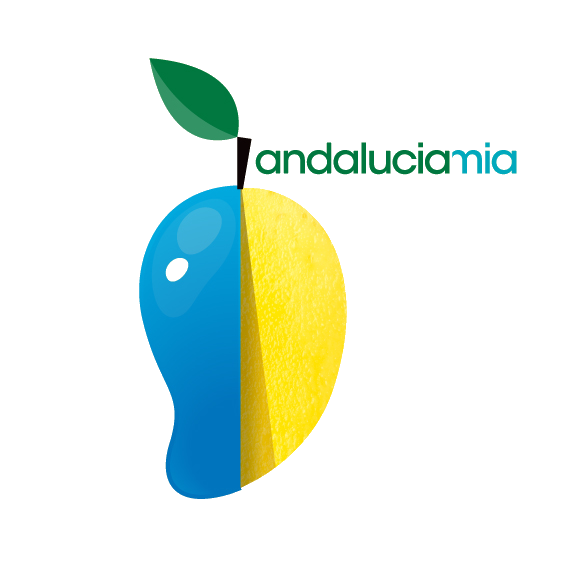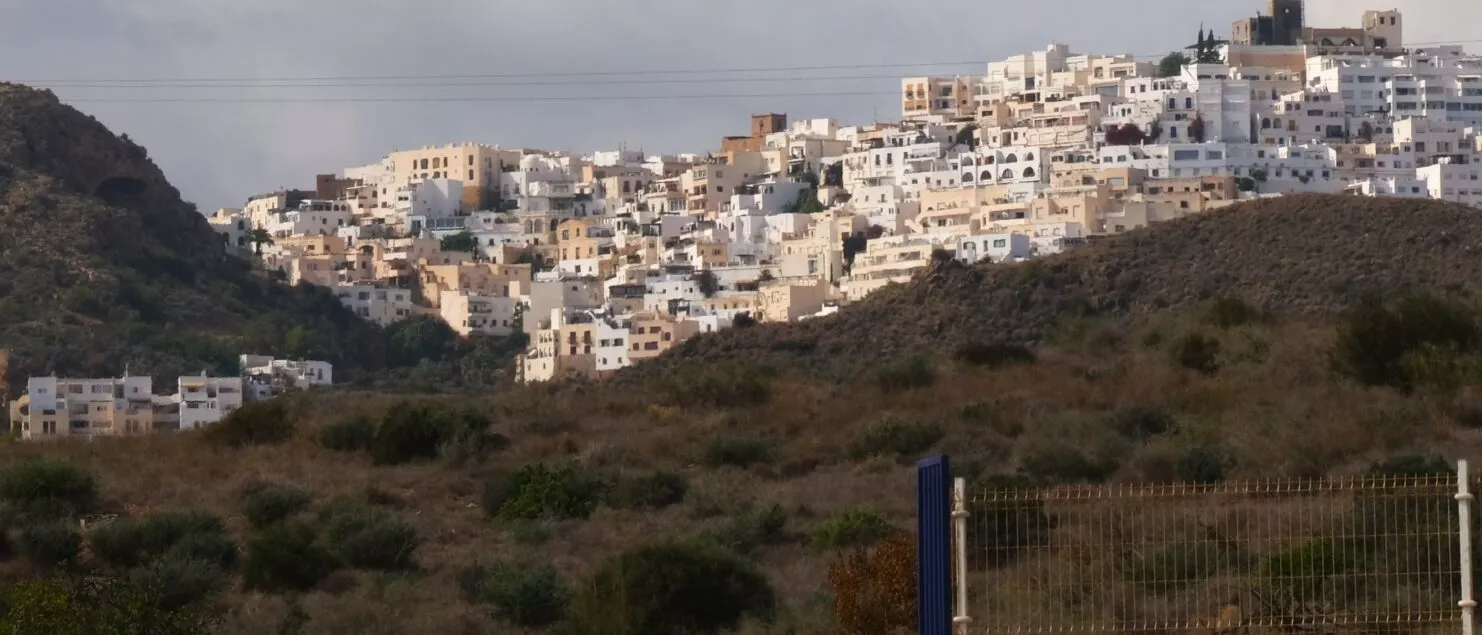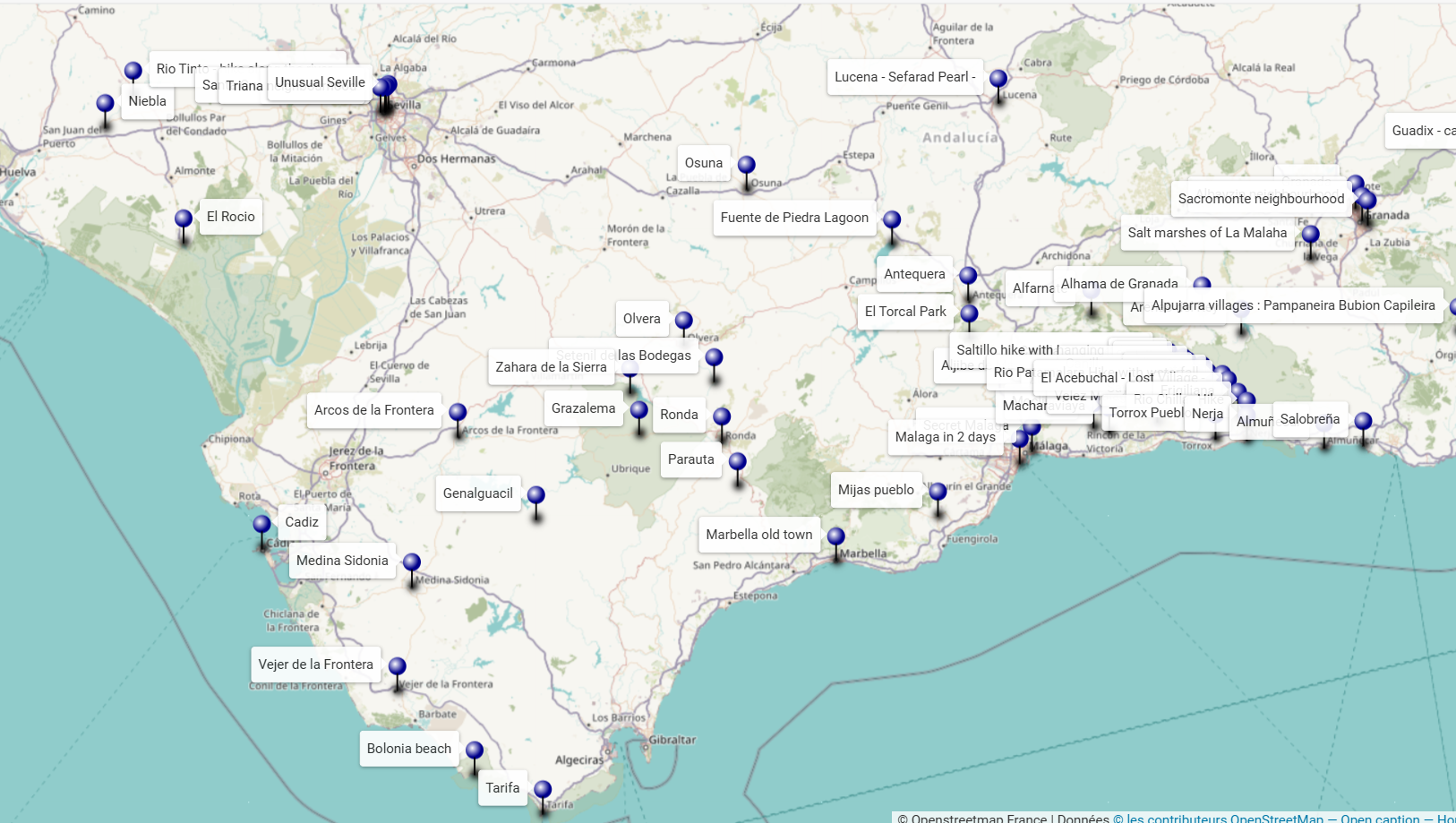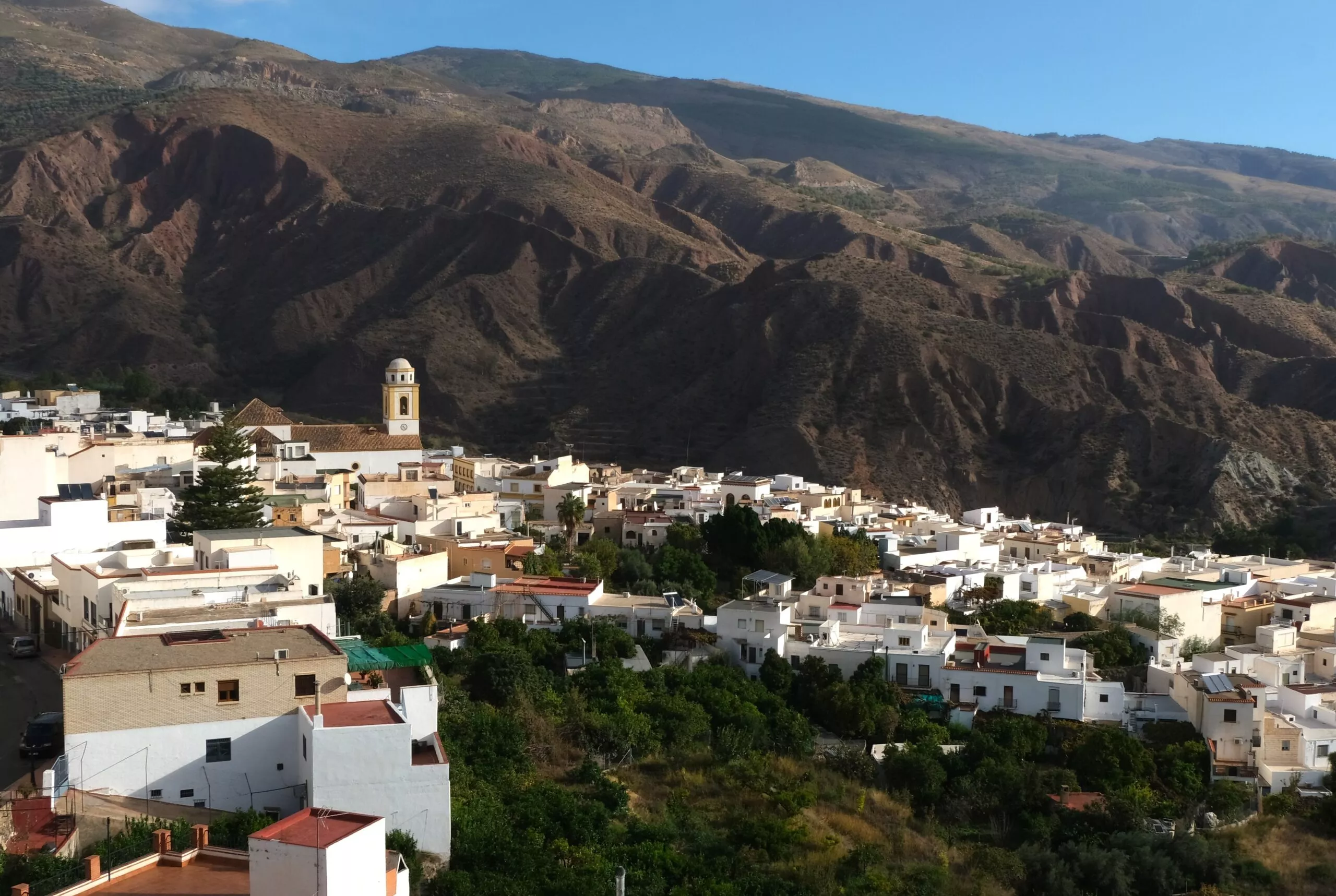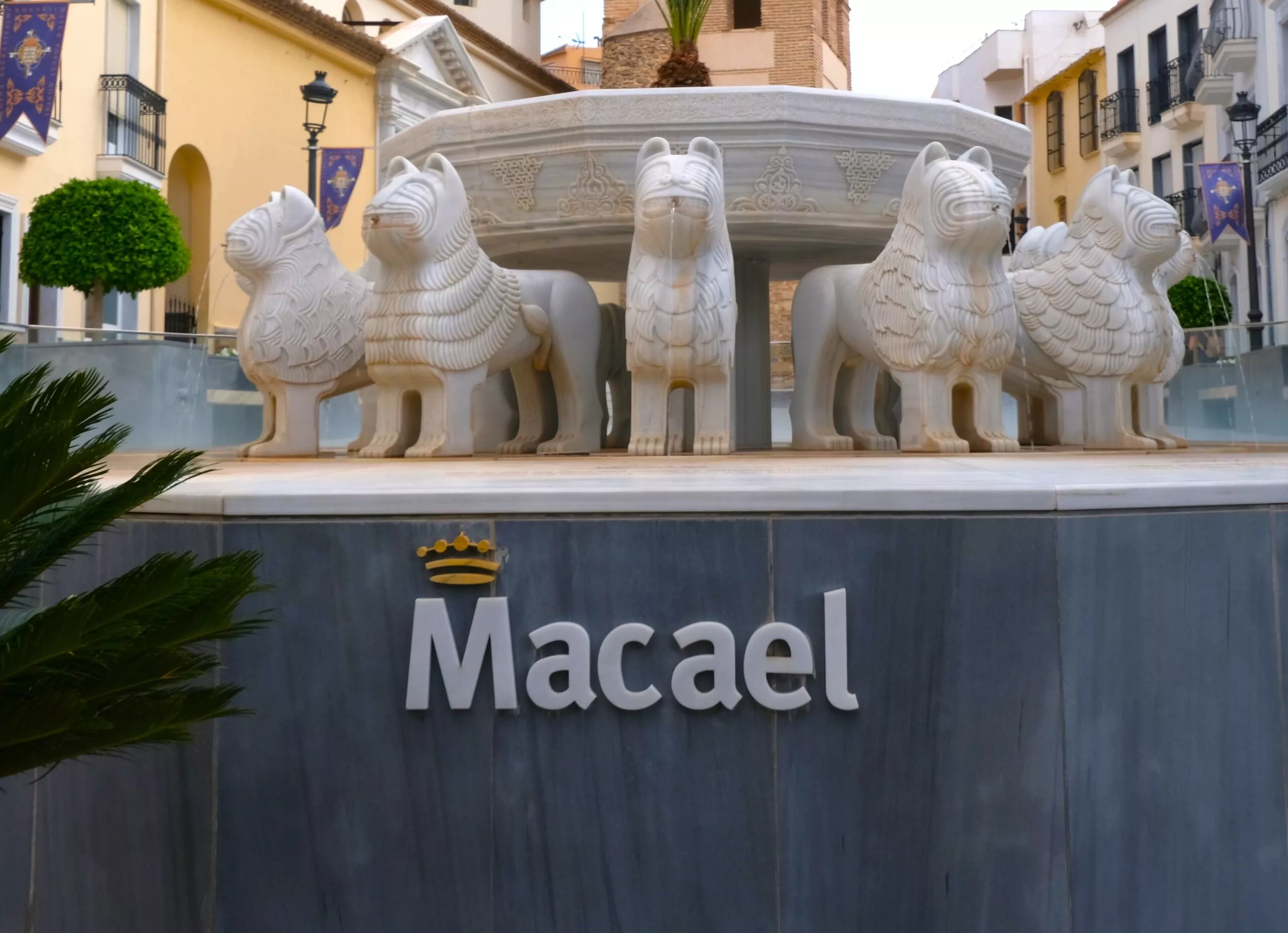What to see in Mojacar, a wonderful white village in Almeria
Discover the essential things to see and do in Mojacar and Mojacar Playa
In this article you’ll find all the information you need to visit Mojacar and see all the sights:
- A few words about Mojacar
- Where is Mojacar on the map?
- What can you see in Mojacar?
- What to do in Mojacar
- Book accommodation
- The best Ferias in Mojacar
- What to see and do in the surrounding area
- Where to park in Mojacar
- Useful links
- Continuing your trip to Andalucia
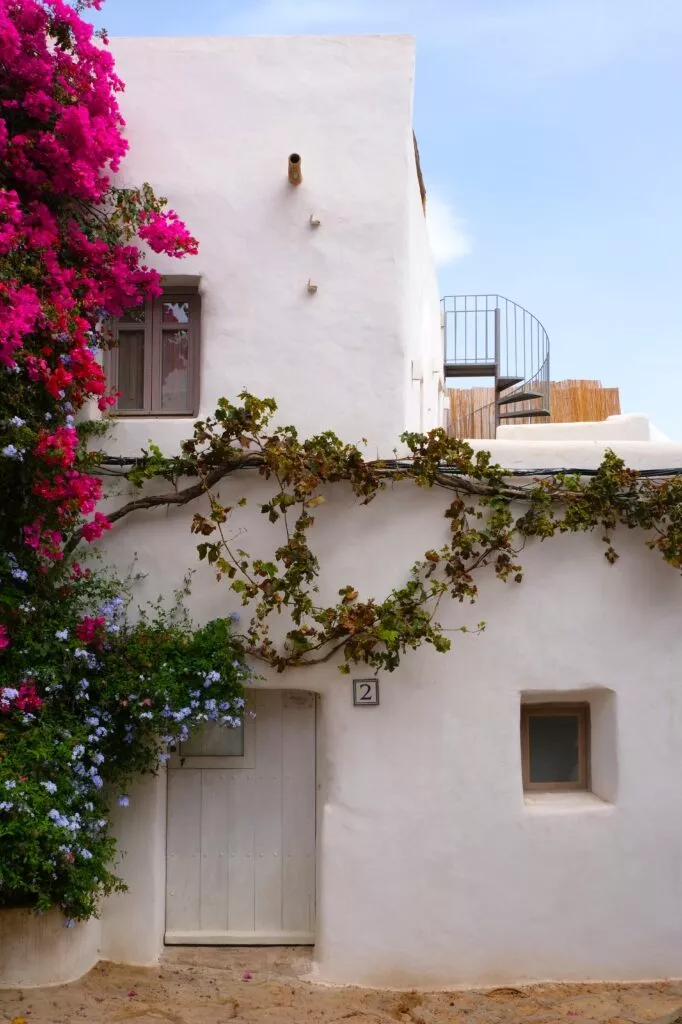
A few words about Mojacar
Mojácar is a beautiful white village in the province of Almería, in the Levante Almeriense region. It is one of the villages in the ‘Pueblos más bonitos de España’ network.
The municipality is divided into two parts, Mojacar – the pueblo – and Mojacar Playa, which boasts some very fine beaches!
A brief history of Mojacar
The first human settlements in Mojacar date back to the Neolithic period. The first settlers were Phoenicians, then Greeks, followed by Romans from the 3rd century onwards, and then Visigoths.
Finally, the Muslim period was the most important, from the 8th to the 15th century.
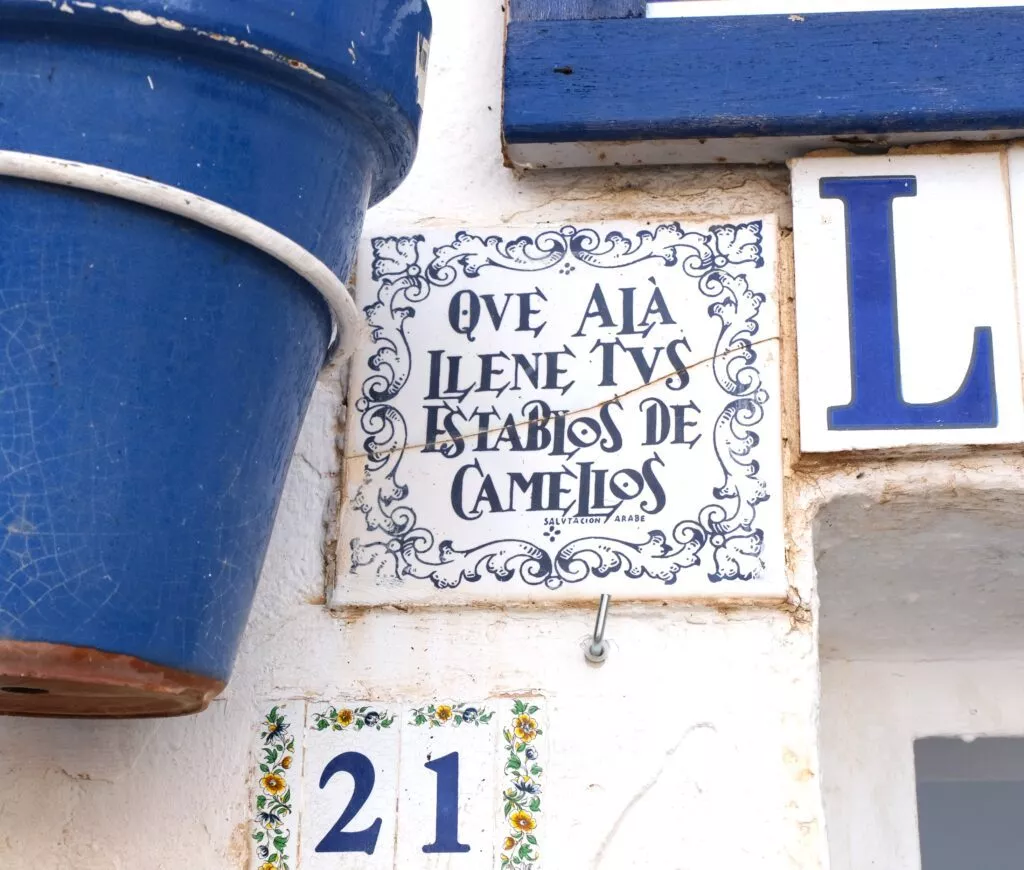
In a 12th-century document by the great cartographer and geographer of the time, Al Idrisi, we can read the ancient name of the village Aqabat Saqar – Munt Saqar – which later became Muyaqar.
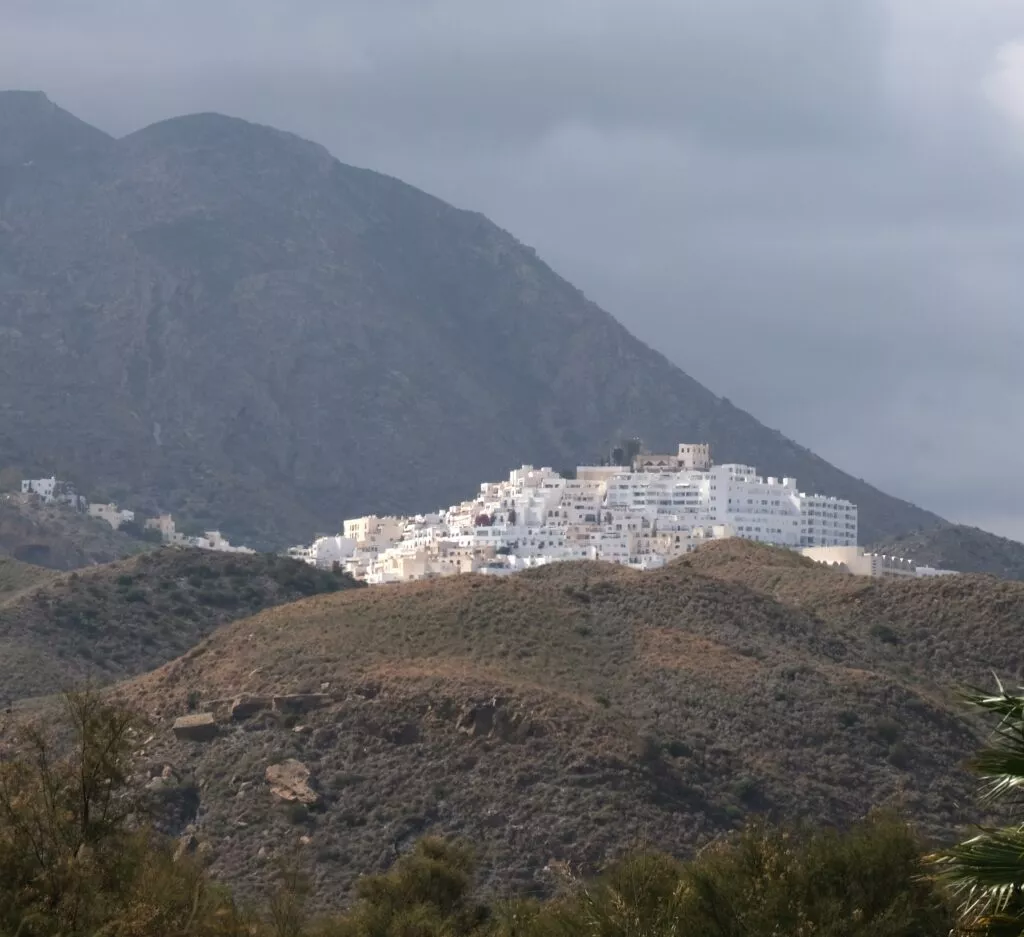
After the conquest in 1488 by Catholic troops, Muyaqar was Spanishised under the name of Mojacar.
Note: that year, Alabez, the mayor of Mojacar, which belonged to the Nasrid kingdom of Granada, did not fight but negotiated with the Catholic troops to avoid a conflict. In exchange, all the inhabitants were allowed to stay.
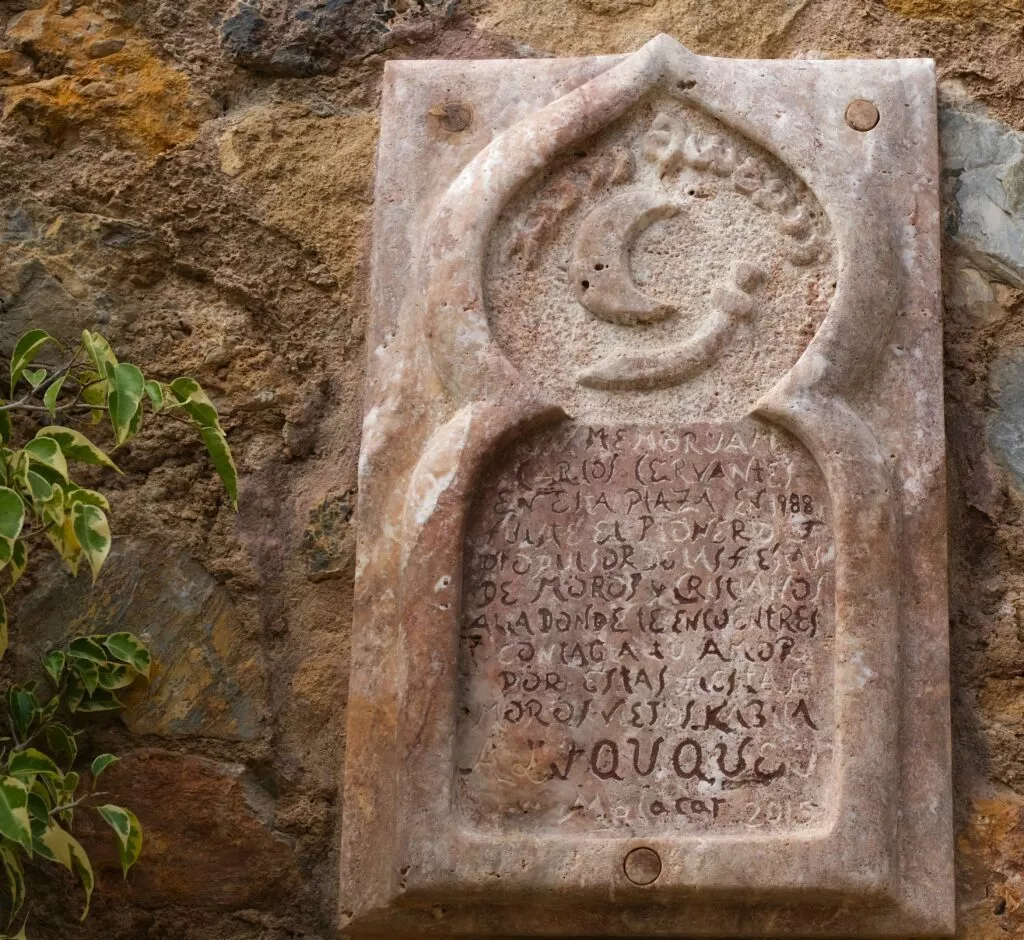
Where is Mojacar on the map?
What to see in Mojacar?
1 – The old town of Mojácar
2 – the Plaza Nueva and its viewpoint
3 – The ‘La Mojaquera’ sculpture
4 – Viewpoint from the castle
5 – Church of Santa María
6 – Plaza del Parterre
7 – Puerta de la Villa (City Gate)
8 – Arrabal district
9 – Mora Fountain
10 – Cave of Mariquita la Posá
11 – La Canana House Museum
12 – The Indalo symbol
13 – Mojacar and Walt Disney
14 – Mojacar’s 17 km of beaches
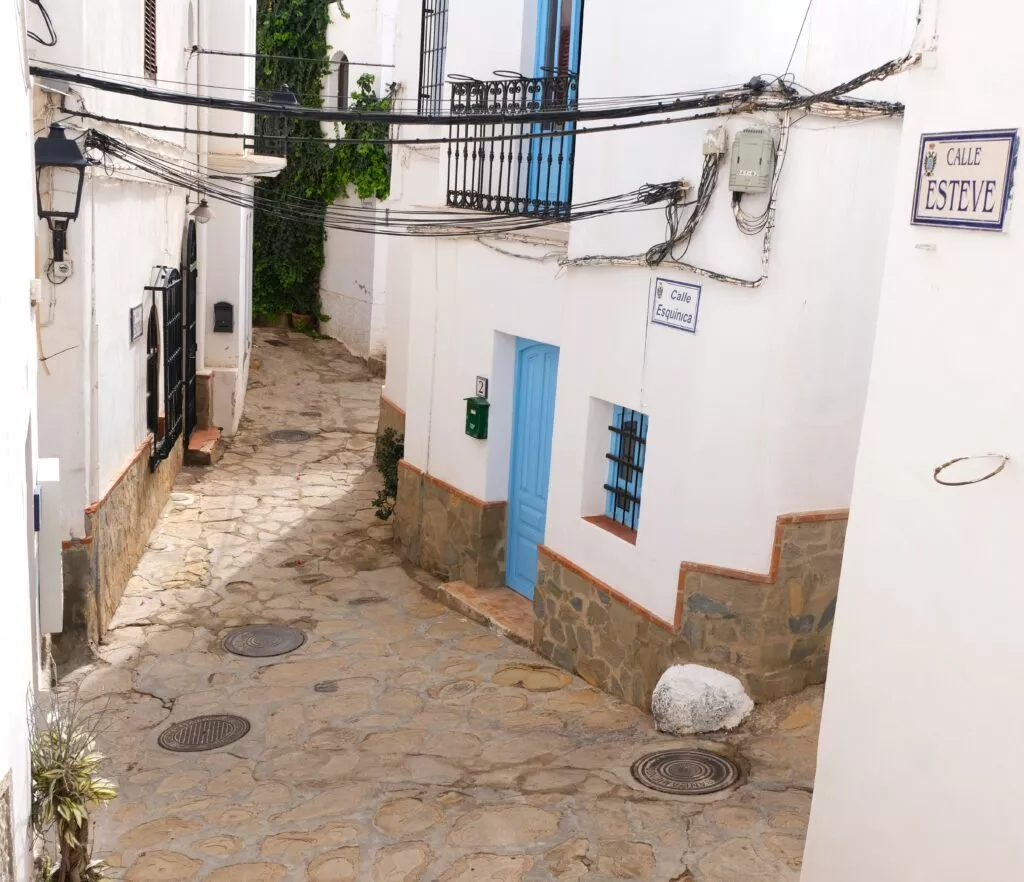
The old town of Mojácar
Visiting Mojacar is first and foremost the pleasure of getting lost in the narrow streets of the old town.
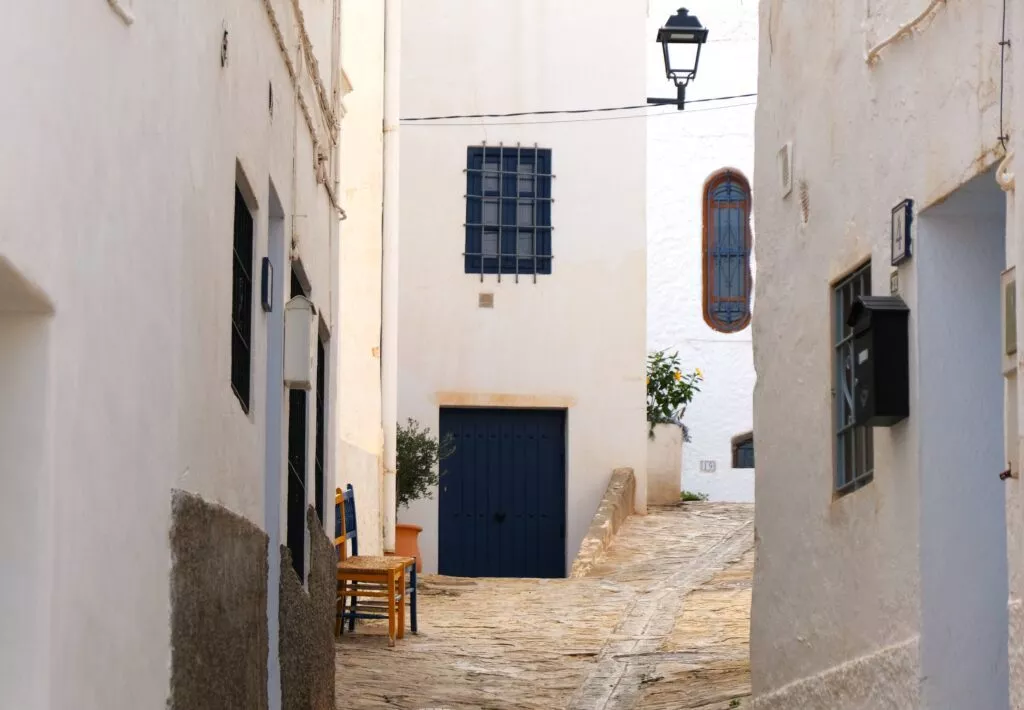
The narrow streets are reminiscent of the structure of the village under Al-Andalus.
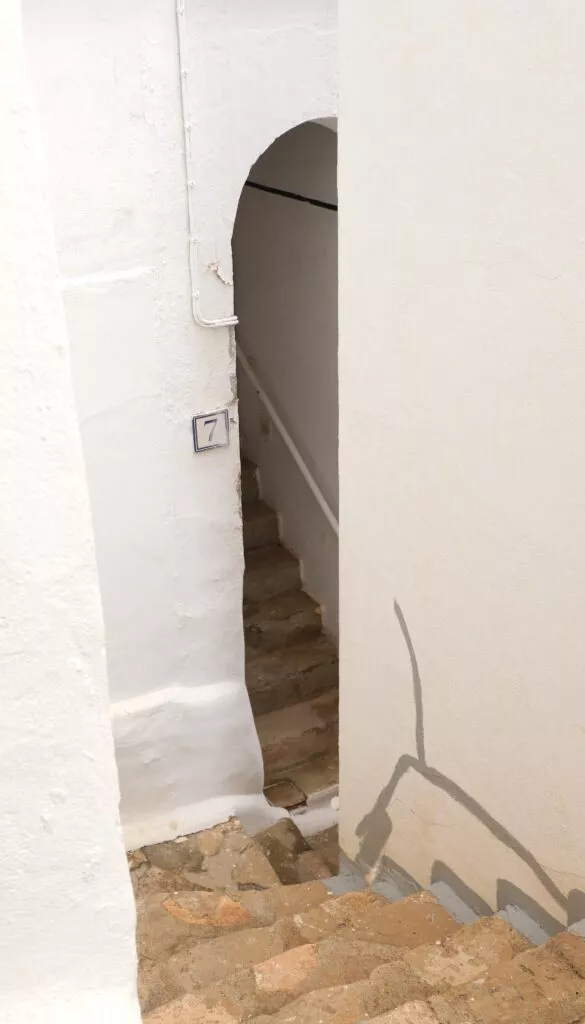
It’s always enchanting to wander through these narrow streets with their old whitewashed houses.
The whole of the old town exudes history through its labyrinthine streets!
The Plaza Nueva and its viewpoint – a must-see in Mojacar
The Plaza Nueva is often a busy place. It’s also an ideal place to relax, have a coffee or lunch in one of the restaurants on the square. There are some great views too.
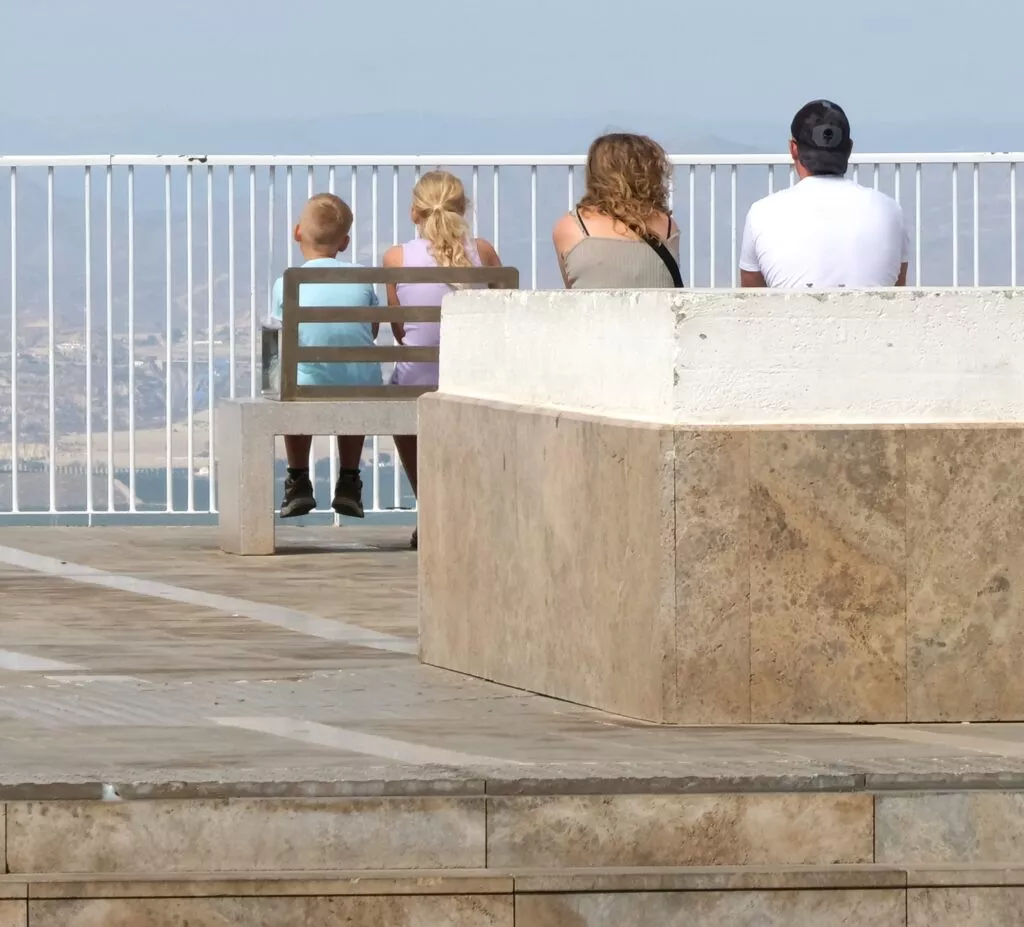
The square is home to the Hermitage of Nuestra Señora de los Dolores. This temple was built in the 16th century on the site of a former mosque. It was later desecrated and is now privately owned.
The Plaza Nueva viewpoint
From this vantage point you can enjoy a superb view, perhaps the finest in Mojacar. You can contemplate the neighbouring villages, the Cabrera, Bédar and Almagrera mountain ranges, as well as the sea.
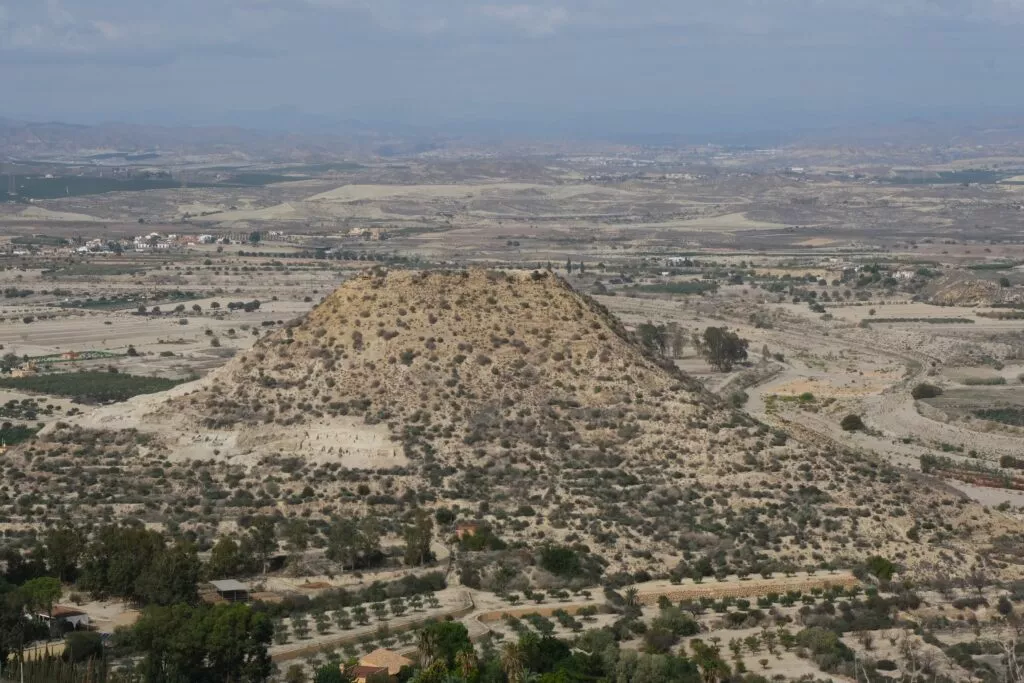
This panoramic view gives you the chance to contemplate what is known locally as the Valley of the Pyramids. These are small pyramid-shaped mountains, formed over the centuries by the erosion of the River Aguas.
The ‘La Mojaquera’ sculpture
This is the symbol of the town of Mojacar: La Mojaquera.
This sculpture represents the women of Mojacar dressed in their traditional costume fetching water from the fountain.
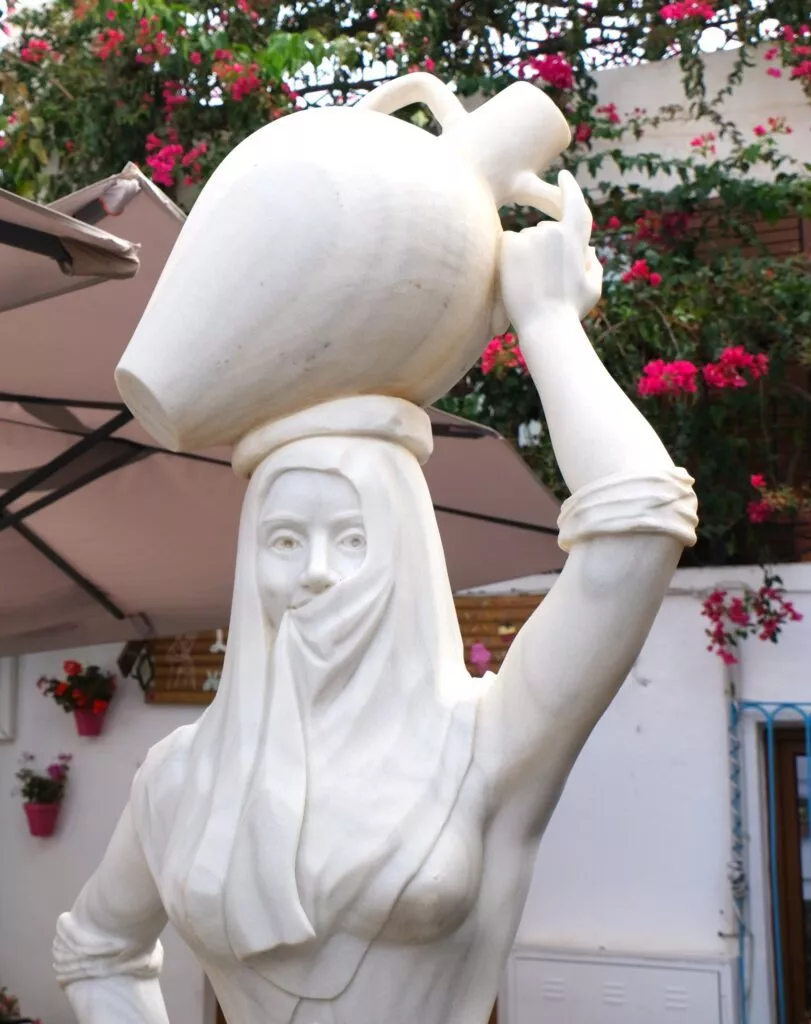
Locally, the Mojaquera is also known as the ‘mujere tapada’, or covered woman.
This piece of cloth was worn in a very unusual way to protect against the sun. The women ‘held’ it by chewing on it. This garment is still worn at certain fiestas in Mojacar (see below).
You can see it in this old photo taken in Mojacar.
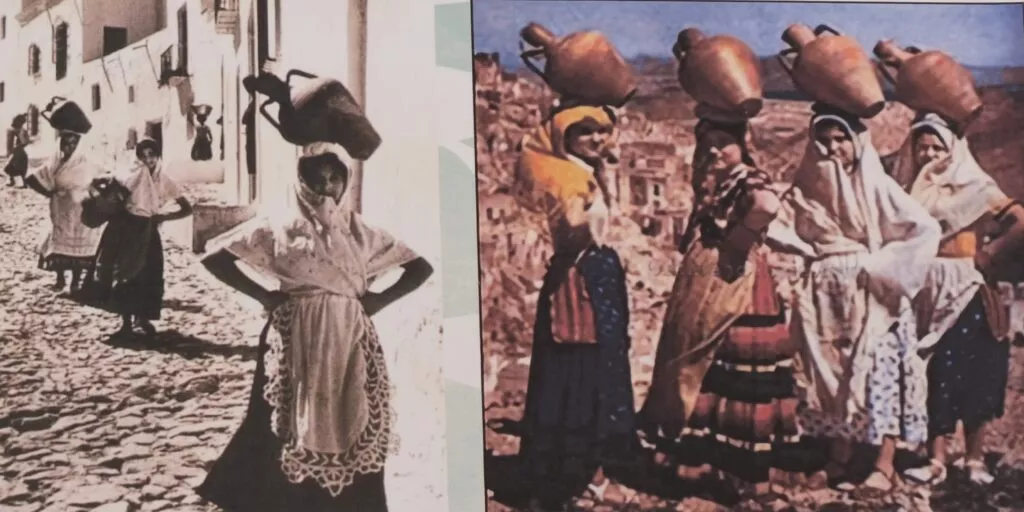
The costume is vaguely reminiscent of the equally distinctive cobijada in Vejer de la Frontera.
This white marble sculpture stands right next to the church of Santa Maria.
Castle viewpoint
This viewpoint is located at the highest point in Mojácar, right next to the old Moorish castle. Very little remains from that period, apart from some of the walls and the aljibe (water tank). The rest was destroyed by an earthquake in 1518.
This site, including the watchtower, was a strategic point for monitoring any attacks from the sea. It is also one of the most beautiful sights in Mojacar.
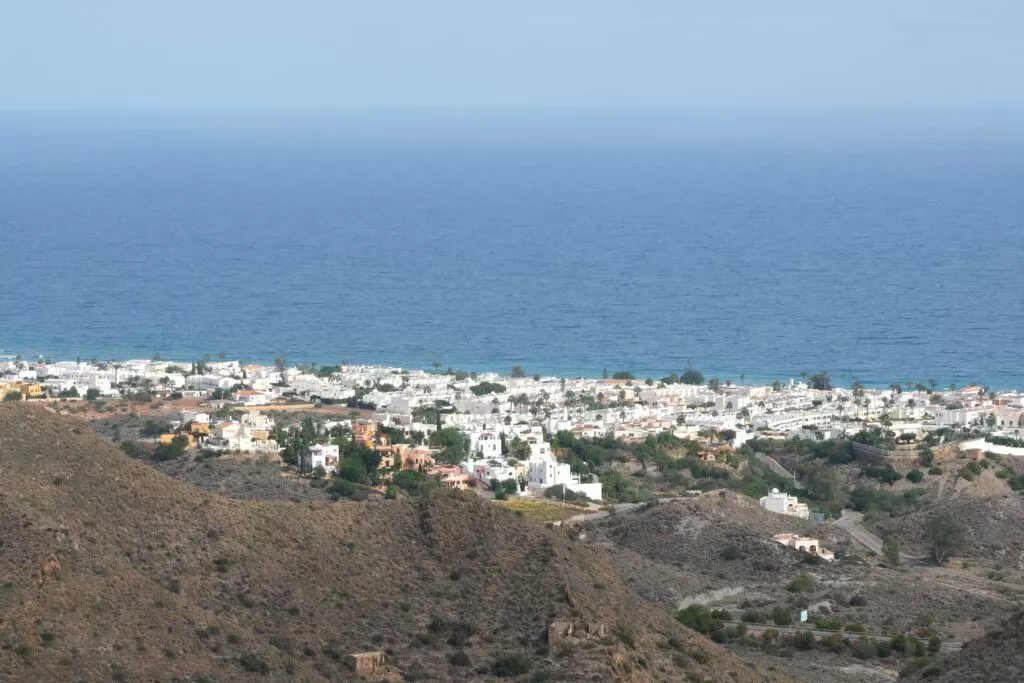
The houses of Mojacar playa can be seen in the foreground.
Church of Santa María
This church, the largest in the village, was built in the 16th century. It stands on the site of a former mosque.
Its sober structure and fortress-like appearance bear little resemblance to the churches built in that century.
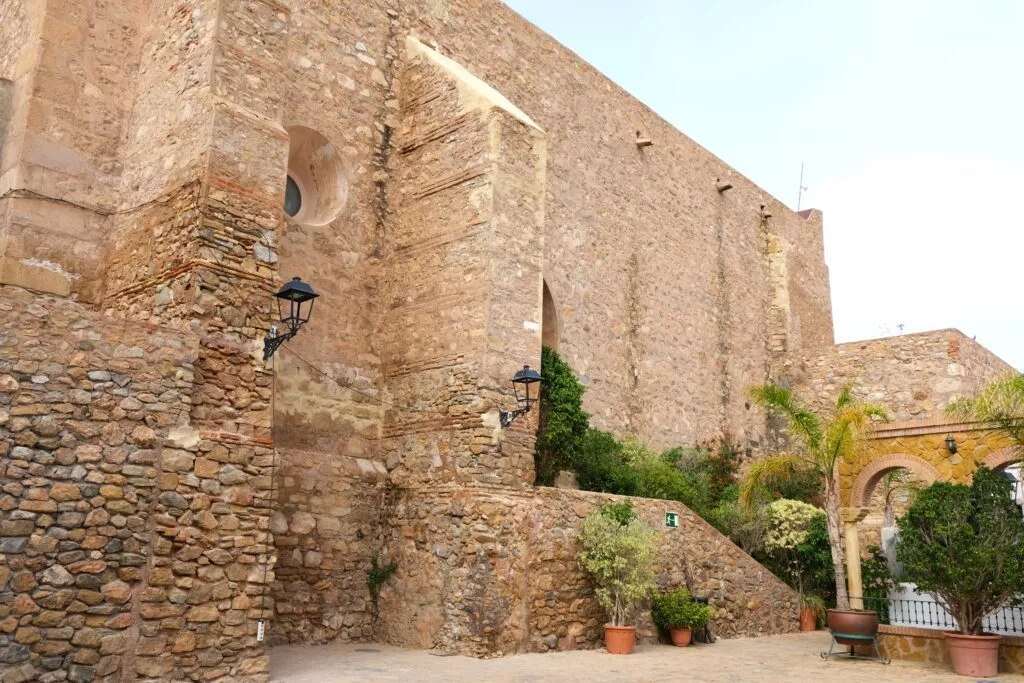
In fact, it was built not only for Christian worship, but also as a refuge in case of attack. Attempted invasions and pirate attacks were frequent at this time.
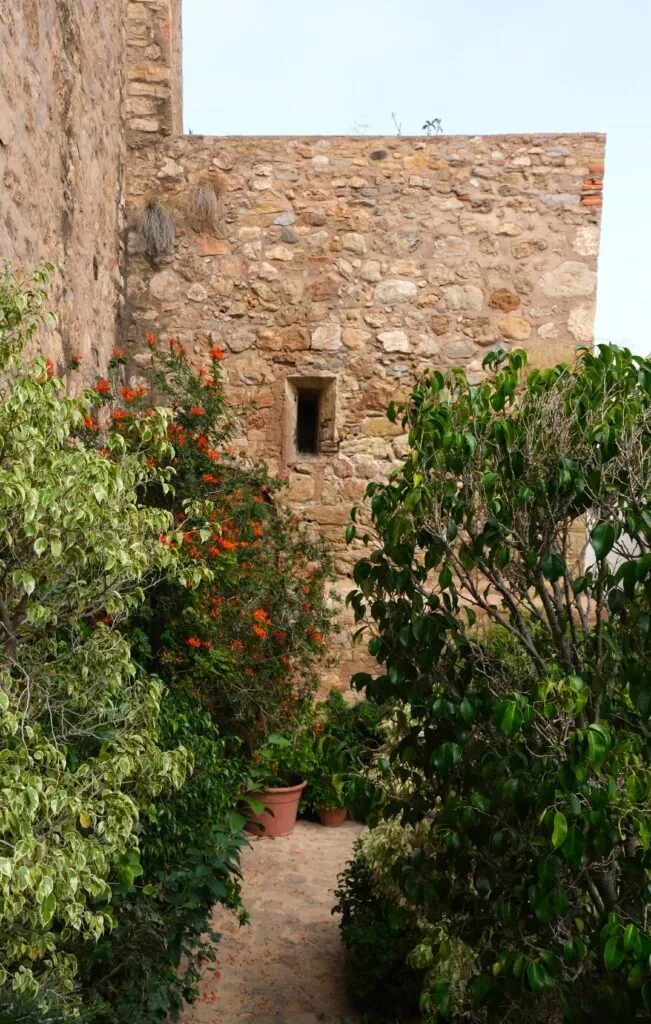
Inside, you can see Mojacar’s two patron saints: the Virgen del Rosario and San Agustín.
Note: recent excavations carried out in this temple have uncovered several burials and remains of pottery dating from the period of Muslim domination.
The Parterre square
This square is located next to the walls of the church of Santa Maria.
It is a historic site in Mojacar, as it was once an Arab necropolis. The tombs found by archaeologists faced east, in the direction of Mecca.
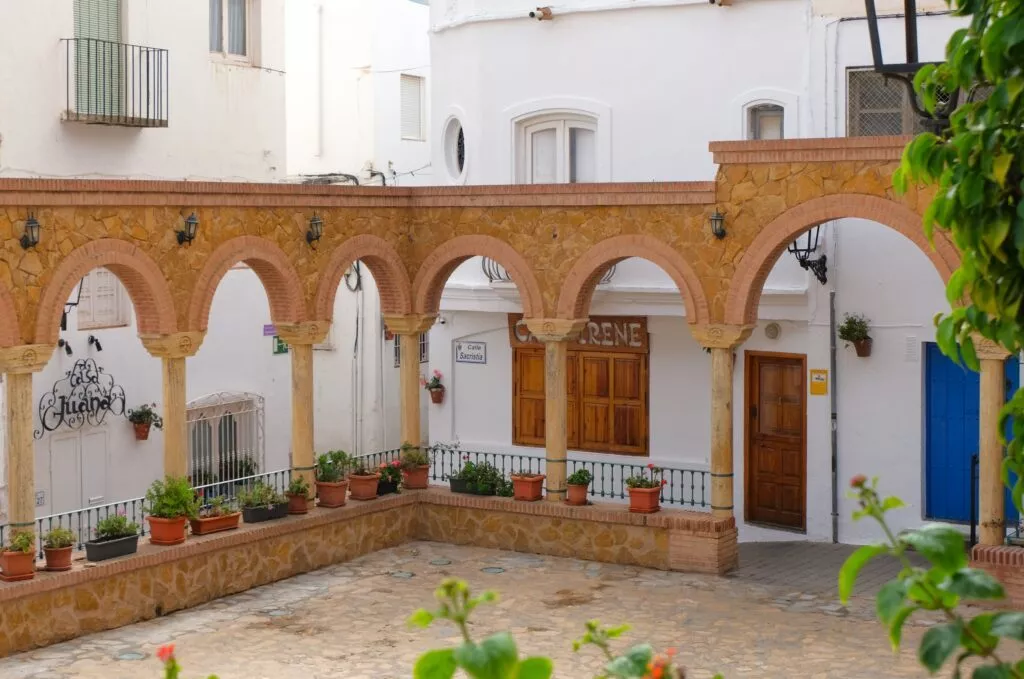
Another feature of one of the corners of this square is a reproduction of part of the choir stalls in Toledo Cathedral, depicting the Reconquest, signed by the artist Itziar Ortuzar.
City gate – Puerta de la Villa – an iconic place to see in Mojacar
This is a must-see in Mojacar, for its great historical interest.
During the period of al-Andalus, this Arab gate served as the point of entry to the Medina of Mojacar. It formed part of the wall that protected the inhabitants. The gate served as a checkpoint to prevent bandits from entering the town.
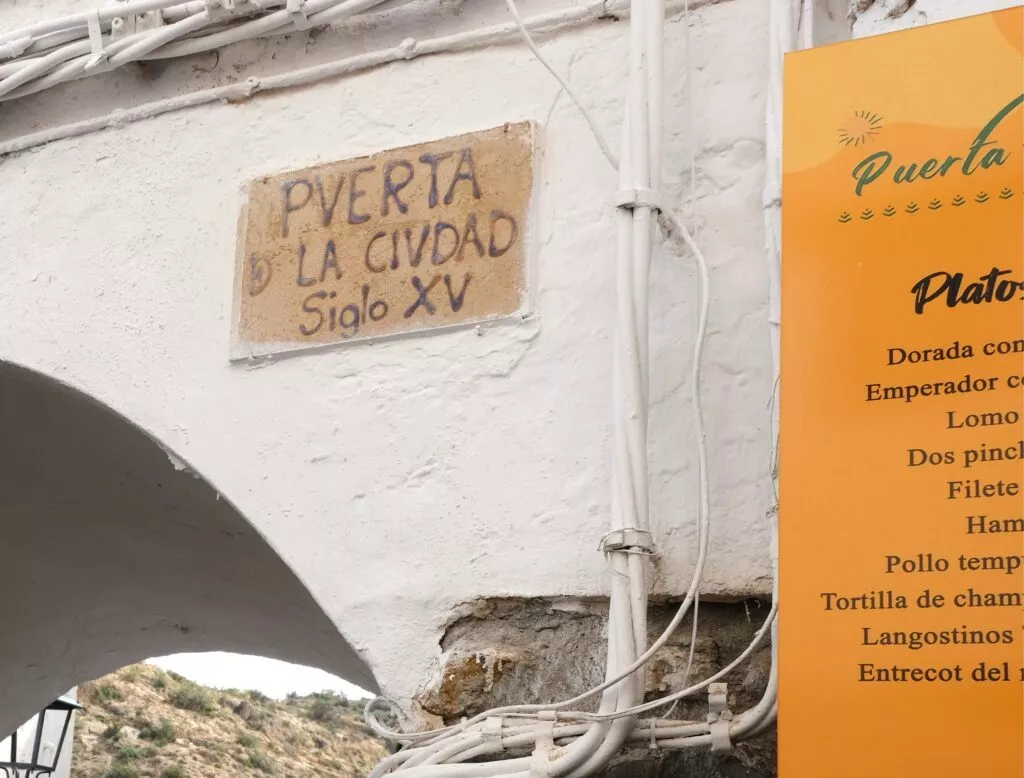
It was also used to tax goods entering the town.
It is located right next to the Plaza de la Flores, where you can see the door of a house with the famous indalo symbol (more on this below).
On the highest part of the door, you can see the representative coat of arms of Mojácar.
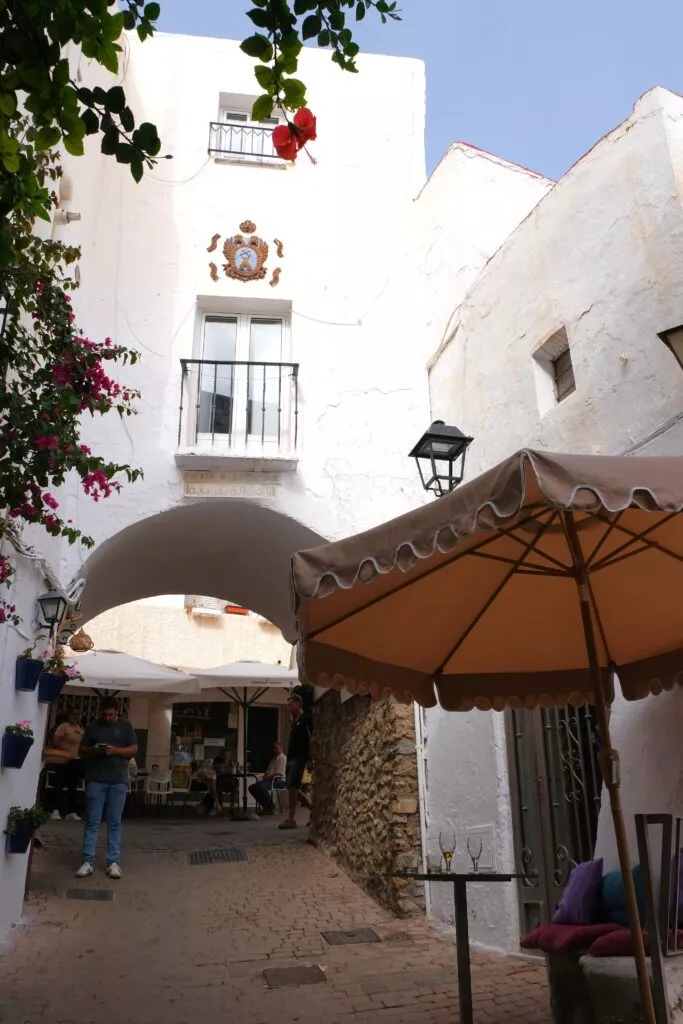
It is also one of the most photogenic corners of the village, thanks to its flowers and the architecture of the houses that surround it.
The Arrabal district – a place not to be missed in Mojacar.

The Arrabal district is located just outside the old Mojacar walls. It can be reached by crossing the Puerta de la Villa and taking Calle Arrabal.
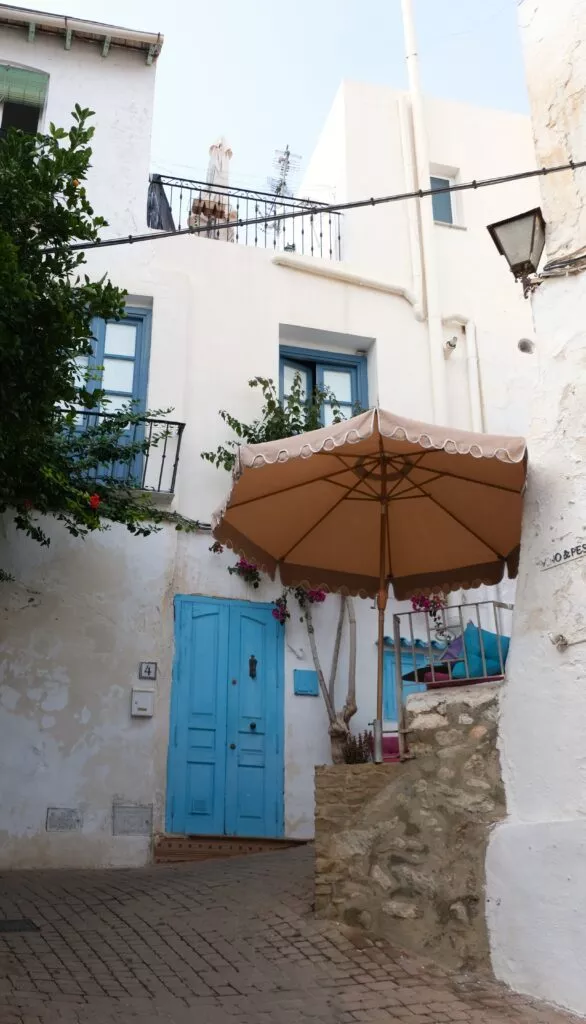
This neighbourhood was built in the 17th century, with its back to the sea and facing the mountains. Arrabal district, built on the site of the former Jewish quarter, is one of the most beautiful in the village. Strolling through its narrow streets, typical of the period, is a delightful experience.
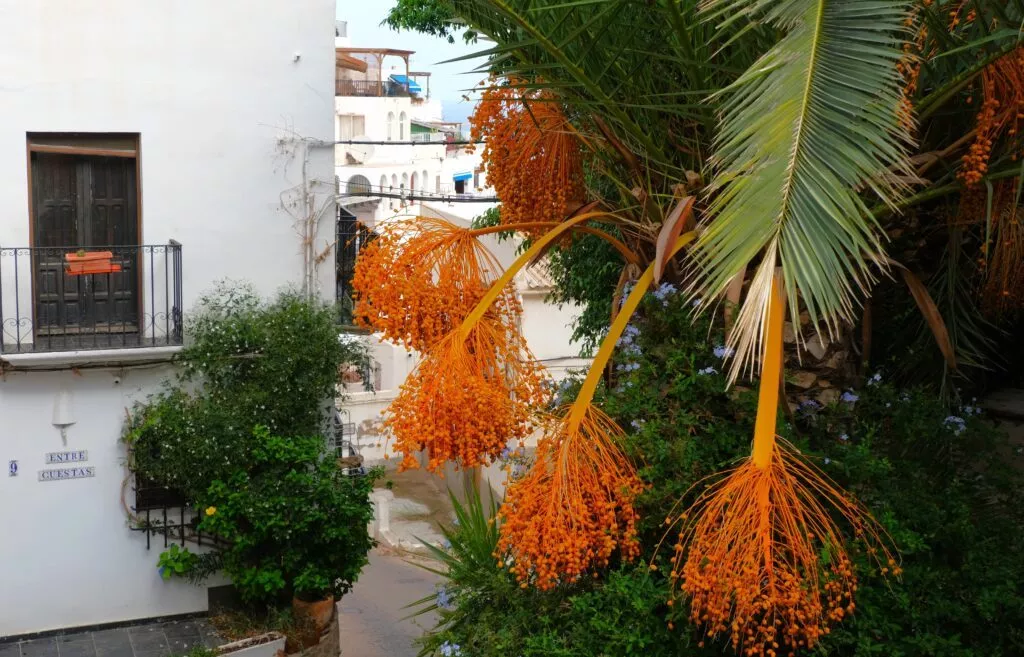
Mora Fountain
The Fuente Mora is a white marble fountain dating from the 13th century. It is the most historically important place in Mojacar.
It was in front of this fountain, in 1488, that the Moorish governor of Mojácar peacefully handed over the keys to the town after the Christians had agreed not to expel the Moors from Mojácar.
This emblematic site is part of the Moros y Cristianos fiesta held every year.
Note: there is also a legend attached to this fountain which says that if you drink the water from the fountain, you are sure to return to Mojácar 🙂 .
Mariquita la Posá cave
This cave is located high above the village, and below the Plaza Nueva.
Its name comes from an old medieval legend whose protagonist is María (Mariquita).
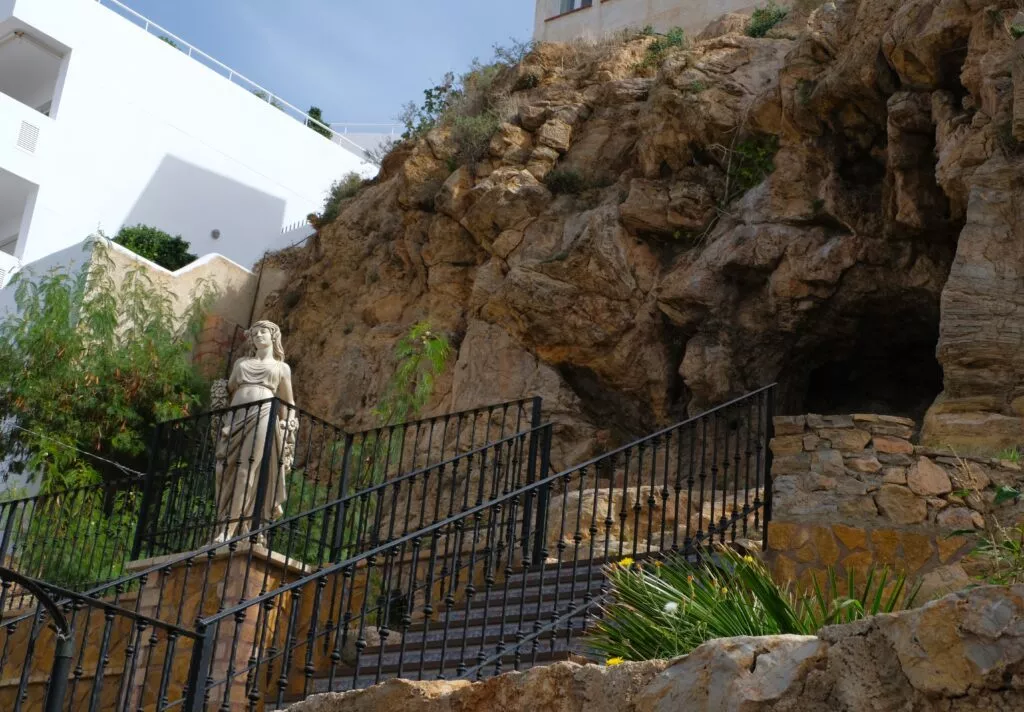
Legend has it that during a period of plague, this cave was inhabited by an old sorcerer. The sorcerer announced that he had found a cure for the terrible disease, but he set a condition for giving it to the villagers: he had to marry María (known as Mariquita), the beautiful young woman he was in love with.
The girl finally agreed to the marriage, under pressure from her parents, in order to save the village. As so often happens, the story has a rather unhappy ending.
La Canana House Museum
This museum is housed in an old house in the historic centre of Mojácar.
The museum’s curious name comes from the fact that many years ago, a woman known as ‘Canana’ lived in this house. She was known for selling tobacco and other necessities.
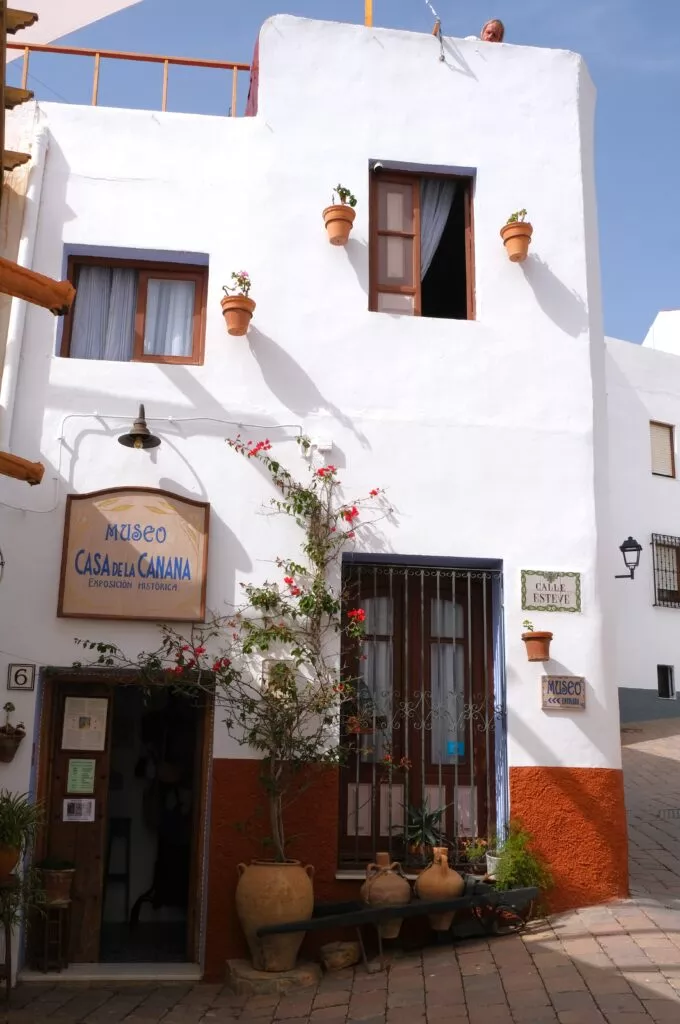
The Museo de la Canana is a local institution. It is a sort of ethnological museum, providing an insight into local life in the first half of the 20th century.
Leaving the museum, you can take a stroll down the narrow, pretty Calle de Enmedio, lined with brightly coloured flower pots.
Street art and Walt Disney
It is said that Walt Disney was born here. It is said that he was the son of a Mojácar woman – Isabel Zamora – who emigrated to the United States.
This legend, which has been gaining ground in recent years, is based on a visit to the town in 1940 by three Americans on behalf of Walt Disney, who were looking for the birth certificate of a certain José Guirao Zamora, born in Mojácar in 1901.
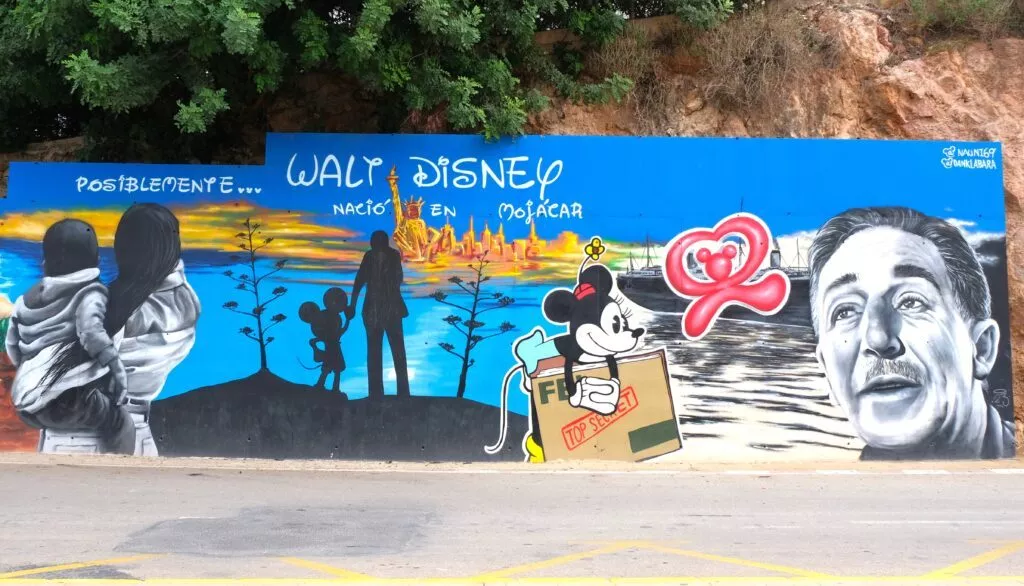
Despite three days of searching the municipal archives, the birth certificate was never found by these three Americans.
Legend or truth? 🙂.
The Indalo
On the facades of some houses you can see the Indalo, the symbol par excellence of Mojácar, which is placed on the doors of houses to protect them from the evil eye.
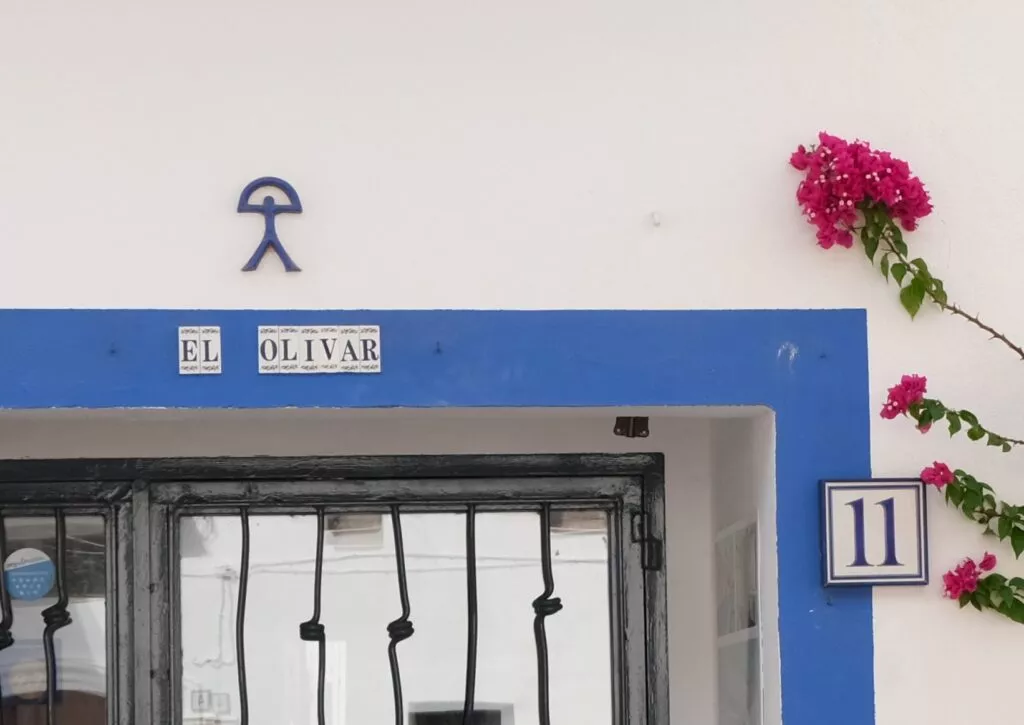
In the 1950s, the Almerian painter Jesús de Perceval founded the indalo movement. The indalo symbol was taken up again, and has since become iconic throughout the Almeria region.
The historical origins of the Indalo
It originated in cave paintings at the Cueva de los Letreros in Vélez Blanco, which depict the indalo.
It is thought to represent a prehistoric god holding a rainbow.
The indalo has now become a symbol of good luck, and is a popular souvenir to take home.
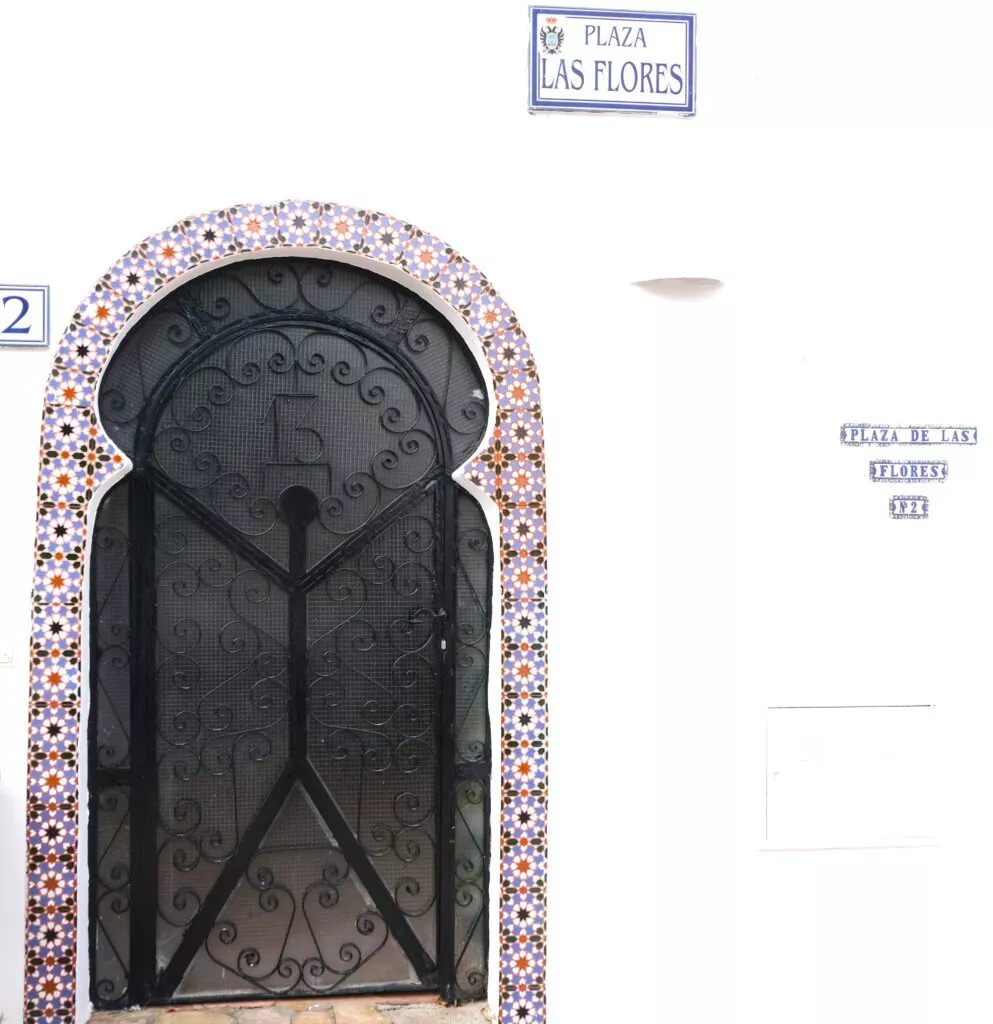
Note: this symbol is not exclusive to the province of Almería, however, as it has been found in other parts of the world, such as Egypt.
Mojacar playa
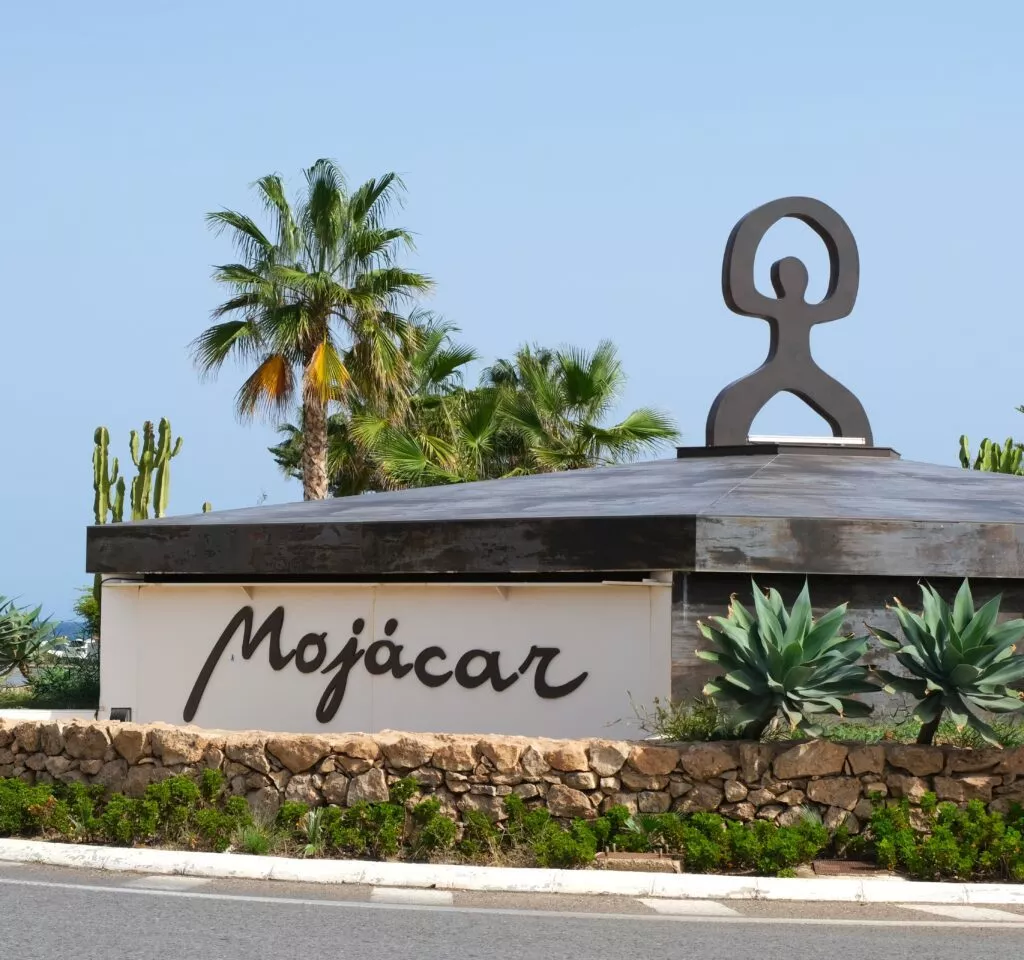
Once you’ve seen the best places to visit in Mojacar, you can hop in the car and drive 5 minutes to Mojacar Playa.
Mojacar has 17 km of coastline with many beautiful beaches, including :
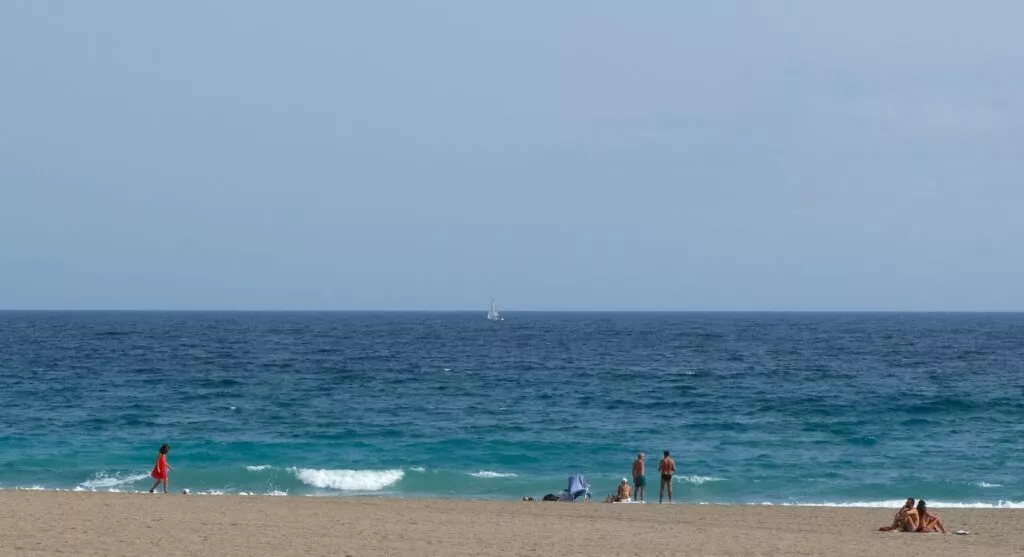
- Playa de Marina de la Torre – Mojacar’s 1st beach when arriving from Garrucha, offering a beautiful view of Mojacar pueblo
- Playa de las Ventanicas
- Playa Cueva del Lobo
- Playa de Piedra Villazar – a beautiful little beach, easily accessible. It is just opposite the Parador de Túrismo de Mojacar.
- Playa de Macenas – on this beach you can see a castle and the Torre del Pirulico. This small castle, with its distinctive shape, was built in the 18th century to defend against pirate attacks.
The 3-kilometre-long paseo maritimo de Mojacar Playa is another great place to take a stroll.
Things to do in Mojacar and Mojacar Playa
Below you’ll find the excursions and activities on offer in Mojacar and the surrounding area.
You can also book them online today (with free cancellation):
Note: 35km from Mojacar you have the opportunity to visit the largest geode in the world: the Geoda de Pulpí. Here’s a link to a guided tour of an olive oil factory, plus admission to the famous geode.
Book accommodation
VHere’s a great little place to stay right in the heart of the village of Mojacar, Hostel El Torreon :
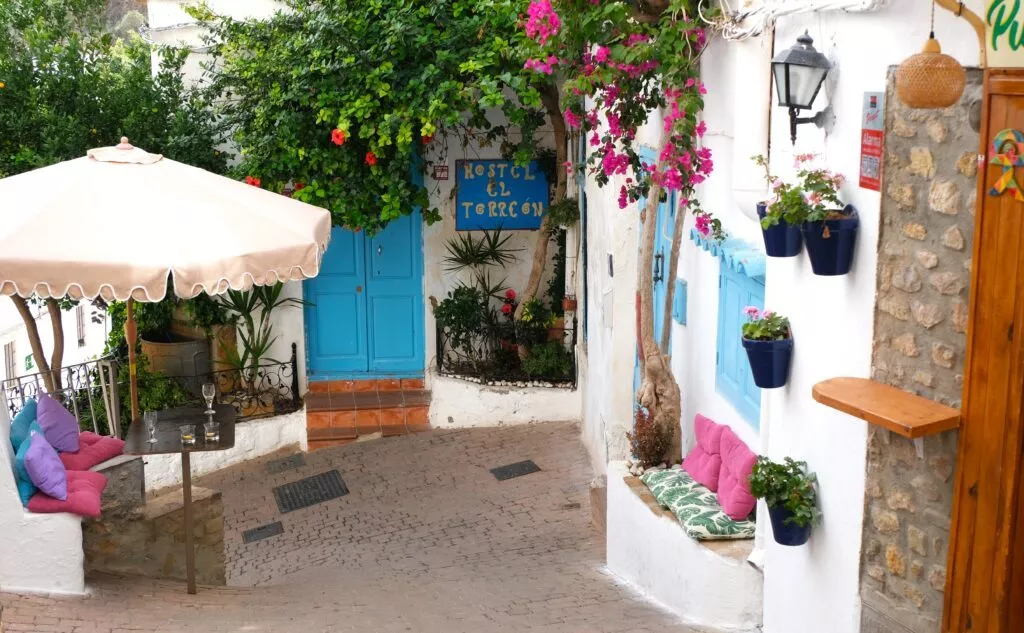
Below you’ll find all the hotels and accommodation available in and around Mojacar after selecting your dates:
Dates of the best ferias in Mojacar
Feria de Mojacar – de San Augustín – in August
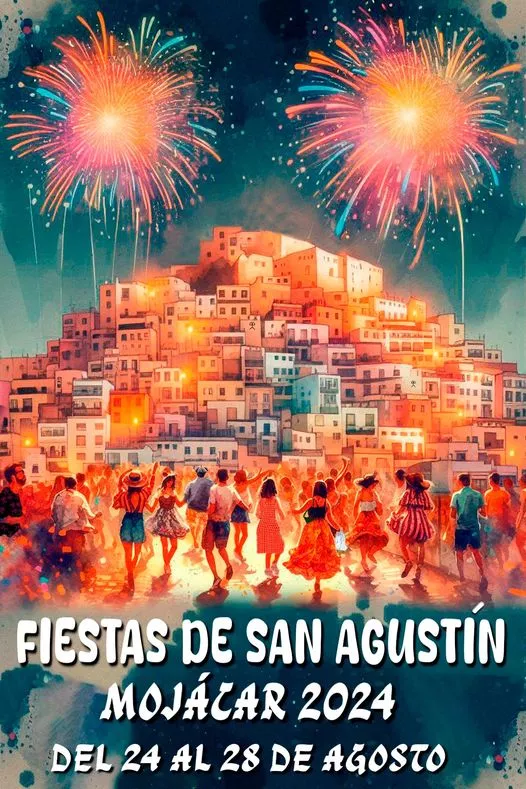
A highlight of this fair is the offering of flowers to the saint, accompanied by a beautiful procession to the church of Santa María, where the women wear the typical Mojácar costume.
Fiesta de Moros y Cristianos in June
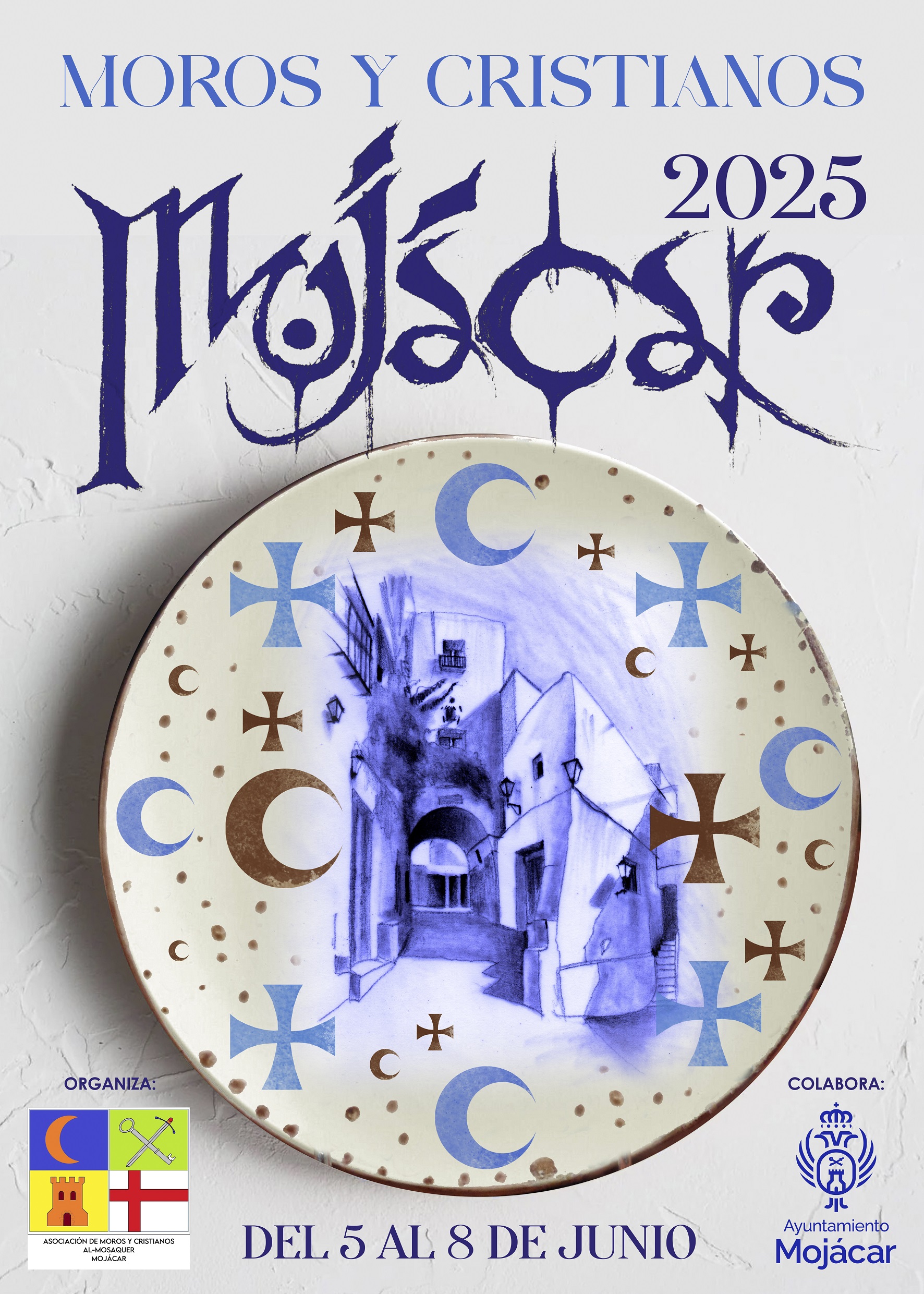
Mojacar’s Fiesta de Moros y Cristianos commemorates the town’s peaceful surrender to the Catholic Monarchs in the fifteenth century.
What to see and do in the Mojacar area
There are some fabulous sites to discover in the area around Mojacar. Here are 4 ideas for visits fairly close to Mojacar.
La Isleta del Moro
La Isleta del Moro is one of my favourites in the province of Almeria. I’ve always been fascinated by its ‘end of the world’ feel.
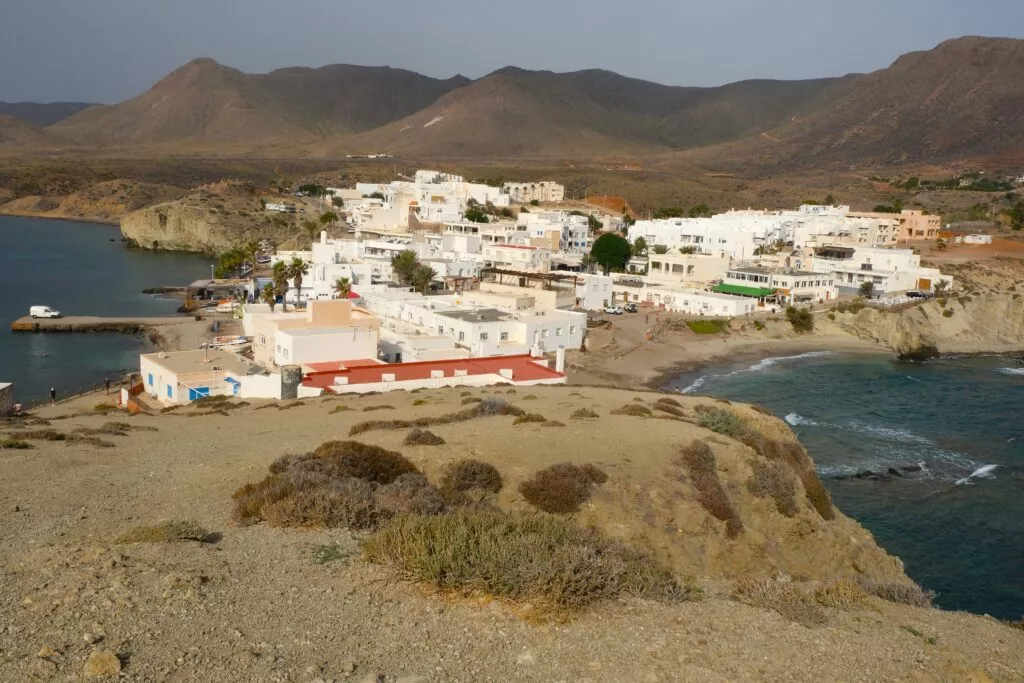
If you get the chance, don’t hesitate to pay a visit to the Isleta del Moro.
Nijar
Nijar is a wonderful village in the province of Almeria. It is on the list of ‘Pueblos más bonitos de España’. Below is a photo of the countryside around Nijar:
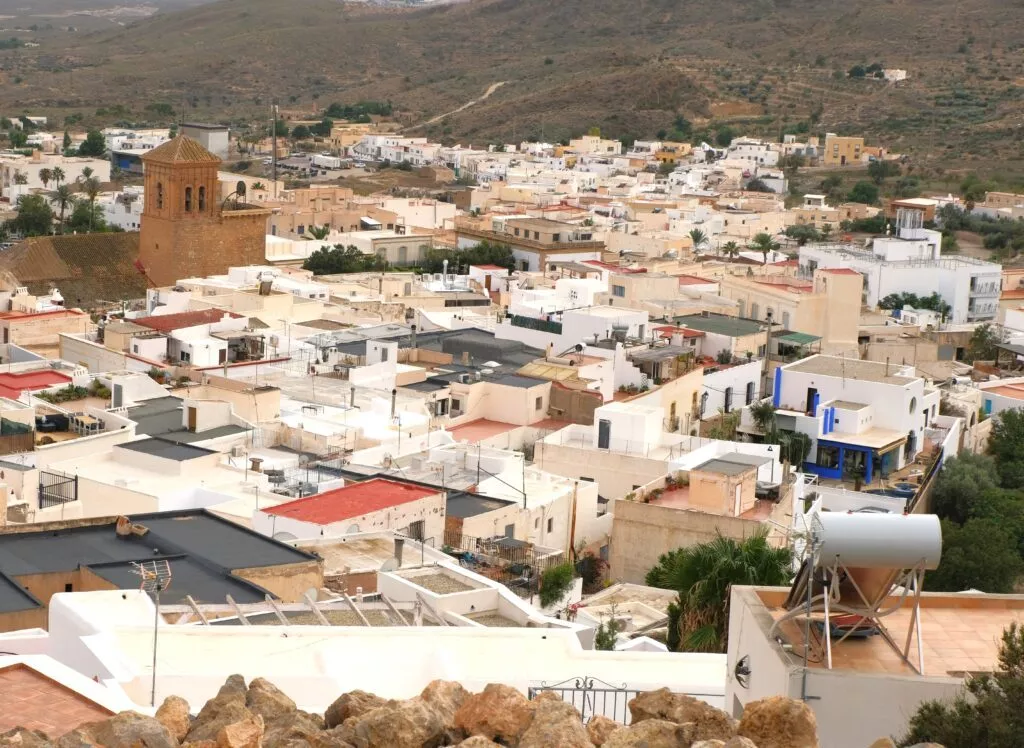
Nijar is the perfect little town from which to explore the province of Almeria. You’ll also find some great things to see in Nijar.
The Tabernas Desert
The Tabernas Desert, covering 280 km², is officially the only desert in Europe.
The scenery, which has been used in numerous films, is absolutely spectacular. Below is a photo of the desert from the Nasrid castle overlooking Tabernas.
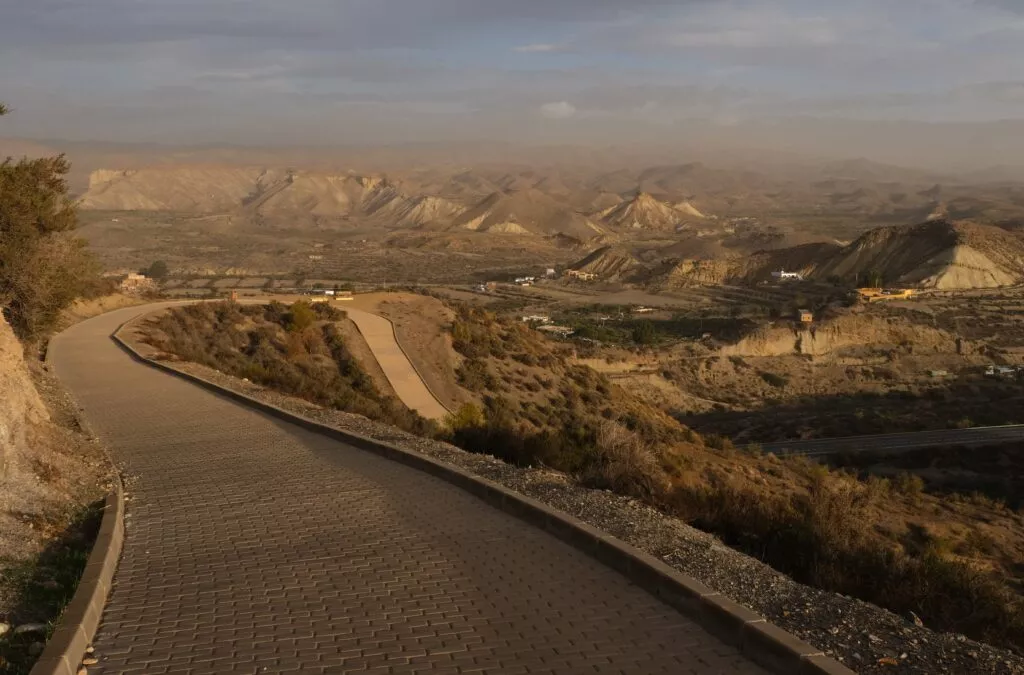
Here’s a link to find out more about the Tabernas desert.
The best beaches and coves in Cabo de Gata
The Cabo de Gata Natural Park is home to some of the most beautiful unspoilt beaches in the world. Among the most famous are Playa de los Muertos (25km from Mojacar), Playa de Monsul and Playa de los Genoveses – pictured below:
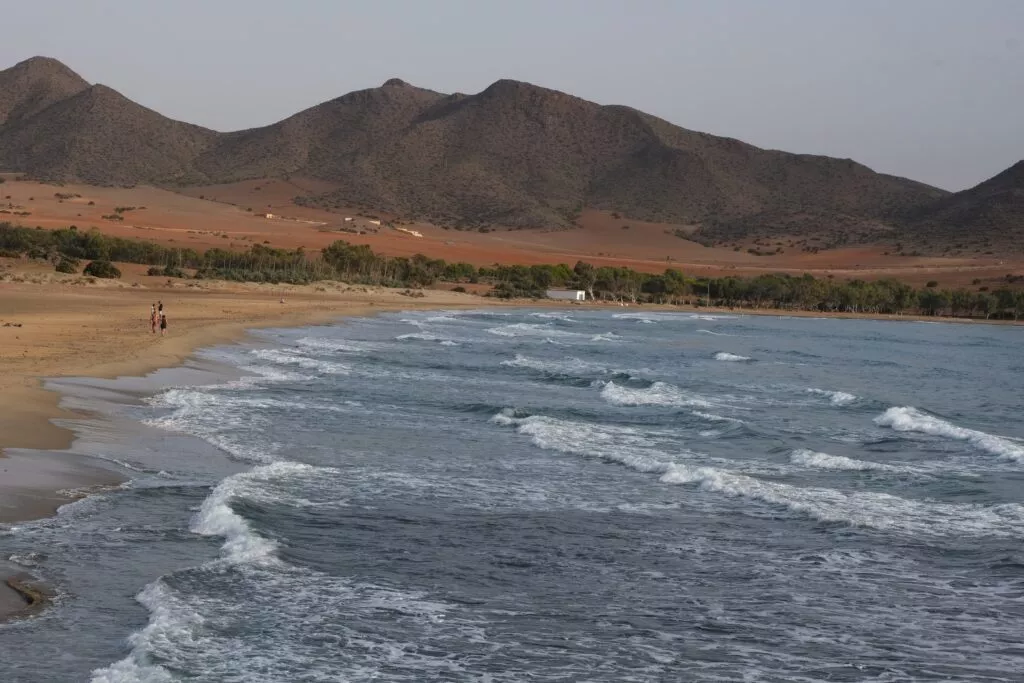
Here’s the link to find out more about the most beautiful beaches in Cabo de Gata.
Where can I park in Mojacar?
There are several car parks in Mojacar. You’ll find a free car park next to the Plaza del Rey Alabez, in the highest part of the village.
Some ideas and useful links
The links below can be very useful depending on where you are staying and what you need to do to have a wonderful time in Andalucia.
- link to book a rental car at Malaga airport.
- If you’re on the Costa del Sol and looking for ideas for excursions in Andalucia, you can use the following link to book a tour departing from Málaga, Torremolinos, Estepona or Benalmadena.
Discover more of Andalusia’s beautiful sites in the Andalucia blog pages.
